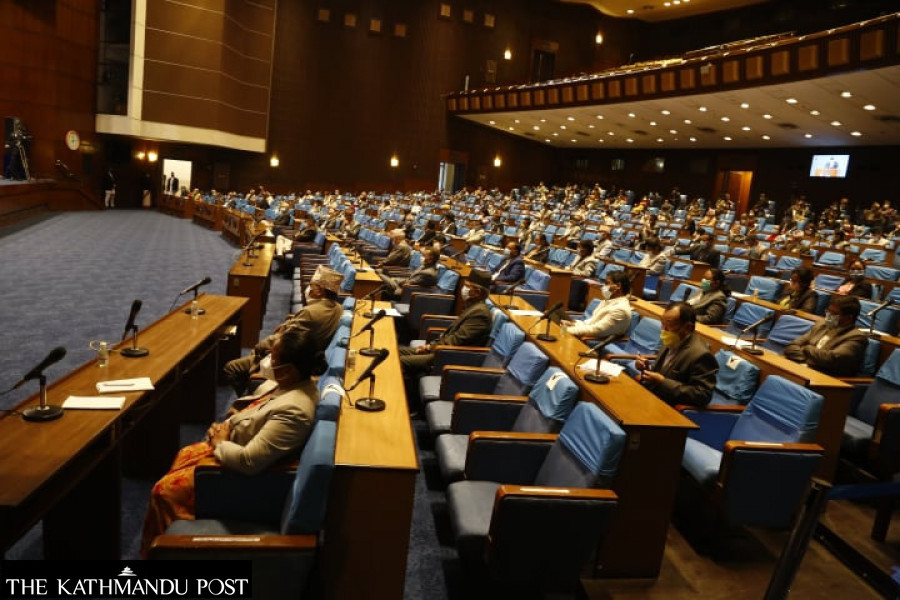National
Government backs off from plan to keep the lower house and provincial assemblies alive until the new houses replace them
Confusion over their terms persists.
Binod Ghimire
The government has moved away from its plan to continue the existing House of Representatives and provincial assemblies until the first meetings of the lower house and provincial assemblies to be elected from the November 20 polls.
Minister for Law, Justice and Parliamentary Affairs Govinda Sharma Bandi on Sunday had tabled a proposal to amend the House of Representatives Act and Provincial Assemblies Act, through some Nepal Acts amendment bill, with the provisions that the lower house and the provincial assemblies will be deemed to have automatically ended from the day the new elected House and the provincial assemblies hold their first meetings.
The House even amended its regulations to shorten the cooling off period of the bill to endorse the amendment bill adopting fast-track process. However, the widespread controversy compelled the government to withdraw the provisions related to the amendments to the Acts related to the elections of the lower house and provincial assemblies from the some Nepal Acts amendment bill.
The Election Commision also objected to the bill to keep the lower house and the provincial assemblies alive until the first meeting of the new house and assemblies. Issuing a press statement on Monday, the commission said the continuation of the terms of the House and assemblies until the first meeting of those elected from the upcoming elections will create a hurdle in implementing the election code of conduct.
Cross-party lawmakers including those from the ruling parties had registered amendments to the bill seeking withdrawal of the provisions related to revisions in the election-related laws. “There must be some legal provisions to fix the tenure of the House of Representatives and the provincial assemblies. The amendment to the elections law would have sorted out the legal confusions about their tenure,” said Bandi, while addressing the parliament. “However, respecting the amendment proposals from lawmakers I withdraw the provisions related to the amendments in the election Acts.” The parliament endorsed the ‘Some Nepal Act Amendment bill” without changes in the election laws.
Bandi said the withdrawal of the provisions related to the changes in the election Acts has created confusion over the tenure of the House of Representatives and provincial assemblies. “The government withdrew the provisions because it was wrongly taken as an attempt to prolong the term of the lower house and provincial assemblies,” he told the Post. “I am not in a position to talk about the tenure because there is no law to guide it.”
Though the constitution says the term of the House would be five years, it doesn't say which date to take as the beginning of its term.
In the lack of legal clarity, the commission had decided to take December 8 (2017), when at least the first winners of both federal and provincial elections under the first-past-the-post category were announced, as the date of commencement of tenure. The commission’s election code of conduct for the upcoming elections says the position of the members of the lower house and provincial assemblies will continue until their nominations.
Similarly, Article 91 (6) (B) of the constitution says the Speaker and deputy Speaker shall continue in office until the date of the filing of nominations for election to the House of Representatives. Same applies with the Speakers and deputy Speakers of the provincial assemblies.
Experts on constitutional and parliamentary affairs say the lower house and the provincial assemblies must come to an end from the day the candidacies are filed. “In fact the House of Representatives and the provincial assemblies must have come to an end the very day the government announced their elections,” Som Bahadur Thapa, a former secretary at the Parliament Secretariat, told the Post. “However, they are still functioning. It would set a bad precedent if they function even after the nominations.”
As per the election schedule, the parties will have to submit the closed list of the candidates under the proportional representation on September 17 and 18 while the nominations for the first-past-the-post will most likely be done on October 8 or 9.
The Election Commission on Monday said the term the Legislature-Parliament in 2017 ended a day before the submission of the closed lists of candidates under the proportional representation system hinting that the ongoing House can not go beyond September 16, a day prior to the submission of the closed list under the proportional representation.
If the practice is followed, the House of Representatives and the provincial assemblies can function for just 11 more days. “It is already late to end the lower house and the provincial assemblies,” Ganesh Datta Bhatta, a former associate professor at Nepal Law Campus, told the Post. “The lawmakers can not go in elections keeping the House alive.”




 20.12°C Kathmandu
20.12°C Kathmandu














